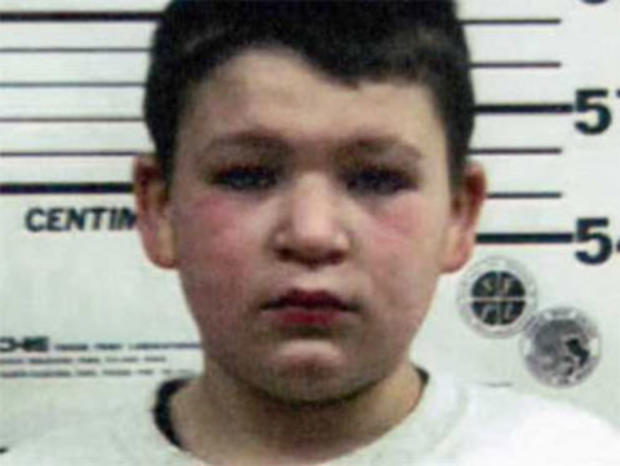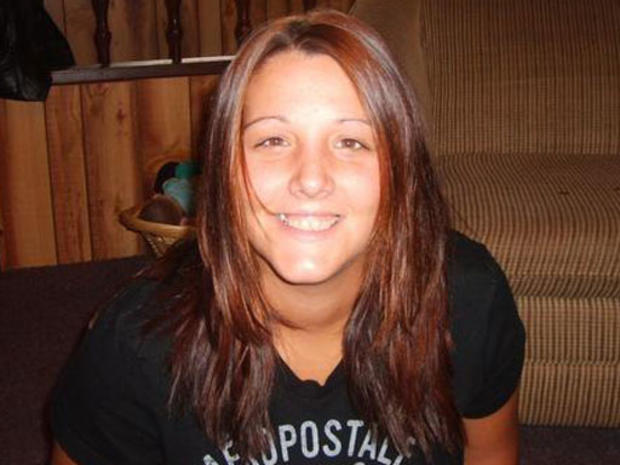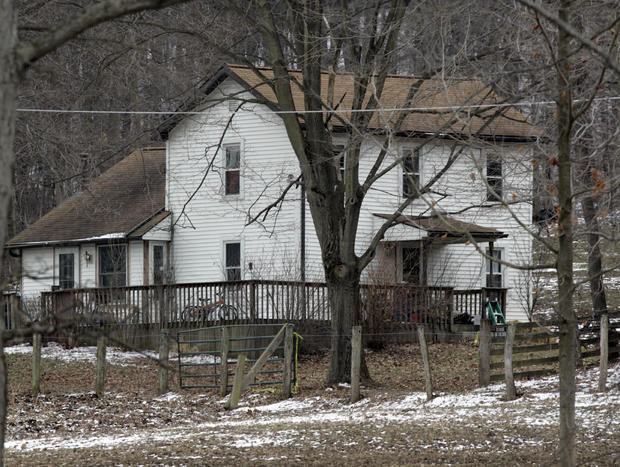Pa. boy convicted of murder at age 11 may get new trial
Jordan Brown, a Pennsylvania boy who insists he is innocent despite being convicted of killing his father's pregnant fiancée when he was just 11, may get a new trial.
In a ruling issued Monday, the Pennsylvania Supreme Court remanded the case back to juvenile court so that Brown, now 17, can have the opportunity to file a motion challenging the weight of the evidence supporting his conviction, and asking for a new trial.
Brown was arrested in February 2009, at the age of 11, and charged as an adult with two counts of first-degree murder in the fatal shooting in Wampum, Pa. of his father's pregnant fiancée, 26-year-old Kenzie Houk, and her unborn child.
The case garnered national attention - if tried and convicted, Brown would have become the youngest person in United States history to face life in prison without the possibility of parole.
After some legal wrangling, Brown's defense attorneys successfully argued to transfer the case to juvenile court and in April 2012, he faced a bench trial and was adjudicated delinquent, the juvenile court equivalent of a guilty verdict. Lawrence County Judge John Hodge deemed Brown in need of treatment, supervision and rehabilitation. He was ordered to reside in a residential treatment facility until the age of 21.
Brown and his attorneys ultimately appealed the conviction to the Pennsylvania Superior Court. In May 2013, his conviction was overturned on the grounds that "the juvenile court committed a palpable abuse of discretion in rendering a ruling that is plainly contrary to the evidence."
The prosecution appealed the state Superior Court's ruling, pushing the case up the ladder to the Pennsylvania Supreme Court, which issued its decision this week.
In its ruling, the state Supreme Court vacated the order of the state Superior Court, which had overturned Brown's conviction. Instead, the court remanded the case back to juvenile court, where Brown will be allowed the opportunity to file a motion for a new trial.
According to Lourdes Rosado, associate director of the Juvenile Law Center, an organization that advocates for the rights of children in the United States, and who serves on Brown's defense team, the case will now go back to Judge Hodge. He is the judge who heard Brown's initial trial in juvenile court. Hodge will take into account the appellate court rulings and will either grant or deny the motion for a new trial.
The timeline for when all of this will take place is not immediately clear. While Rosado says she's happy that Brown is getting the opportunity to ask for a new trial, she expressed concern about how long all of this will take.
"Time for children is really of the essence," she told 48 Hours' Crimesider Monday evening. "Every day that he's there is another day of his life."
Brown has always maintained his innocence, but police and prosecutors say he took his 20-gauge, youth-model shotgun and killed Houk the morning of February 20, 2009, moments before he left for school with Houk's 7-year-old daughter.
Investigators suggested at trial that Brown was jealous of Houk's unborn son, who died of oxygen deprivation after she was shot execution-style. Houk was more than eight months pregnant when she died.
Brown was arrested less than 24 hours after the murder, seemingly indicating it was an open-and-shut case, but the appellate court rulings have raised questions as to whether it really was.
While the evidence against Brown is compelling, it is mostly circumstantial.
The Pennsylvania Superior Court found that the juvenile court's guilty verdict was largely based on testimony from a landscaper who arrived shortly after Brown and Houk's 7-year-old daughter caught the school bus at the end of the driveway on the morning of the murder.
It had snowed that morning and the landscaper testified that when he drove into the driveway, he didn't observe any tire tracks. He also testified that the only footprints he observed in the driveway were two sets of small footprints.
It wasn't long after arriving, the landscaper testified, that a young girl - Houk's 4-year-old daughter - came outside of the house, crying, saying, "My mommy is dead, she won't wake up."
Based on the landscaper's testimony, the juvenile court found that "the only imprints observed in the snow on that morning were the children's footprints leading from the house to the bus stop" and "there is no indication that another person approached the residence, either by foot or in a vehicle after the children left and before [the landscaper] arrived with his employees."
The landscaper's testimony was used to limit the possible perpetrators of the crime to Brown and Houk's two young daughters, ages 4 and 7 - making Brown the most likely choice among those three.
The state Superior Court ruled this was an invalid conclusion to reach since the landscaper only testified about imprints in the driveway and not about imprints anywhere else on the property, including at or around any of the four unlocked entries to the residence. In fact, no witness testified to observing an absence of footprints anywhere else on the property that morning.
But there was other evidence used to convict Brown, too, all of which was contested by the defense.
Investigators testified at trial that while several shotguns and rifles were located in the Houk/Brown home on the day of the murder, only Jordan Brown's gun - a youth model 20-gauge shotgun - had the smell of burnt gunpowder, indicating it had been recently fired. They also testified they found a 20-gauge shot shell casing, in what they say was pristine condition, near the residence.
The defense however, argued that Jordan and his father, Chris, frequently shot guns on their property and had gone to a turkey shoot just days before where Jordan had used his gun.
Investigators found no blood, DNA or fingerprints on Jordan's gun and while an autopsy indicated that Houk was shot with a small caliber shotgun, investigators could not say with certainty that Jordan's gun was the murder weapon.
Also during trial, a forensic expert testified that the shirt and pants Jordan was wearing on the day of the murders tested positive for gunshot residue. This too, while compelling, wasn't irrefutable. The expert testified that gunshot residue particles have an enduring presence on clothing, noting, "If I discharged a firearm and took my clothes off, put them in the corner of my room and they were undisturbed for a month, two months, a year, and then tested those clothes, you could still find gunshot residue on them."
Both opinions issued by the appellate courts referenced another potential suspect in the case - Adam Harvey, Kenzie Houk's ex-boyfriend.
At the time of the murder, Houk and her family had an order of protection against Harvey alleging Harvey called Houk's mother in February 2008 and threatened to "take out" her whole family.
"He has left several messages threatening to hurt me and my family. I am in fear of him hurting me physically or my family," Houk is quoted as saying in the order of protection, filed in March 2008.
Less than two weeks before the murder, Harvey received paternity test results showing Houk's 4-year-old daughter was not his biological daughter. Brown's defense attorneys argued at trial that Harvey was upset that the child, who he believed was his, was in fact not.
Then, on the night before the murder, Harvey had to be escorted from a local club after an encounter with Houk's parents.
In an interview with police on the day of the murder, Jordan, when asked whether he noticed any unusual cars or people around his house that morning, said he saw a black truck parked by his garage. Harvey drives a black truck.
But according to police, Harvey had nothing to do with Houk's death and was never charged in the case.
Harvey had an alibi. He said he was home sleeping in the basement of his parents' house the morning of the murder, a story corroborated by his father.
Harvey's hands also tested negative for gunshot residue and the officers who pulled him over that afternoon to take him in for questioning said his vehicle looked like he had just gotten into it. There was snow on the hood and roof of his car and he was at an intersection just two blocks away from his father's house. The investigators opined that Harvey could not have have driven to Houk's home - which is about 8-10 miles away from his parents' home - and then back without the snow coming off.
Instead, authorities say, the evidence led them to Jordan.



